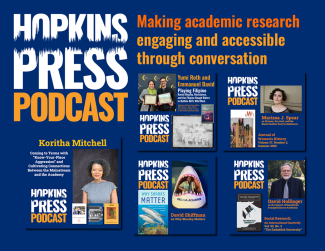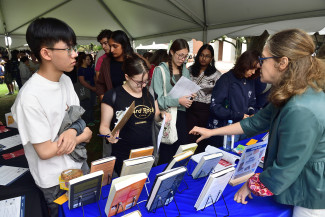
Johns Hopkins UniversityEst. 1876
America’s First Research University
Notes from My Year as a Cyber Investigator

![]()
Much of the creative energy in the University Press world is committed to pushing in new directions, whether they are new directions in research, advanced strategies for marketing and publicizing books, or new scheduling experiments. When I heard of the project—funded by the National Endowment of the Humanities and the Andrew W. Mellon Foundation—to create an online repository of JHUP’s out-of-print books, it felt like a different kind of experiment. True, it was an opportunity to continue experimenting with the exciting new mode of publishing Open Access books; but it was also an opportunity to bring back some of JHUP’s most important books that at the time only existed in libraries, used bookstores, and on the shelves of readers. This was a unique project that simultaneously looked forward and backward.
Before this project presented its many unique production and design problems—all handled fabulously by my expert colleagues—it presented one big author relations problem: in order to sign a new contract for each of these books, how does one contact with 200 people (or their living relatives) when so many of them have retired from their professional lives, and when the JHUP editors with whom they collaborated have long since retired or passed away?
When I started this project, I was blissfully unaware that these were concerns. I thought this would be simple—just a matter of popping in headphones, putting on an unseemly true crime podcast about some 1920s axe murderer, and mindlessly assembling and then subsequently chugging through a spreadsheet of names, email after email, until I’d made contact with the names in every cell. As with many projects that dig “into the weeds” of publishing, so to speak, this project felt like a massive abstraction, several layers removed from the people who wrote each book, and even further removed from the people discussed in each book. Surely this was just another task that I could tear through in a few afternoons.
Oh, dear reader: I was wrong.
Very quickly, this became a months-long process. For living authors, the project was fairly straightforward. For dead ones, it was an entirely different story. In an effort to contact either the author of each book or one of their surviving family members, I found myself calling mortuaries asking for information on estate-holders. I pestered agents in New York and county clerks in Virginia, Alabama, and western Massachusetts. I called funeral directors and obituary writers asking for information on authors’ families. I sent out letters to addresses scribbled onto old contracts from the 1980s in vague hopes that I would get a response. I faxed out contracts, and contracts were faxed back to me (did I say that correctly? Is “fax” a verb? It sounds wrong). I scanned archives on ancestry.com looking to find some relative, somewhere. I slid into the LinkedIn and Instagram DMs of lawyers, actors, professors, and artists, all the diverse children of the many authors with whom JHUP has collaborated. And I never, ever had the mental capacity to also listen to a podcast.
Pretty soon, my work on this grant exposed me to the full range of human emotions on an hourly basis. I would take out a chunk of time each Thursday and Friday morning to read archived obituaries of JHUP authors past (my ‘obituary hours’ as they were morbidly scheduled on my Microsoft Outlook calendar), reading about death after tragic death, perusing sections about surviving family members and looking for people that I could contact through social media. But whenever I managed to touch base with a surviving family member or colleague, no matter what relationship they had to the deceased, the responses were almost always the same: it feels like they are back with me again.
In the process, I learned that in publishing there are almost never abstractions. For every cell in every gruesomely vast shared spreadsheet, there was a scholar thrilled to see their work back in circulation; for every FileMaker record, there was a partner remembering a loved one; for every EPUB and MOBI file, there was a child for whom the reissue of their parent’s work conjured up memories of their departed loved one. New technology, too, can peer backward.
William Krause is an acquisitions assistant at Johns Hopkins University Press.
View over 100 Open Access books from JHU Press at this link. Discover more about the project at our Open Access landing page.


